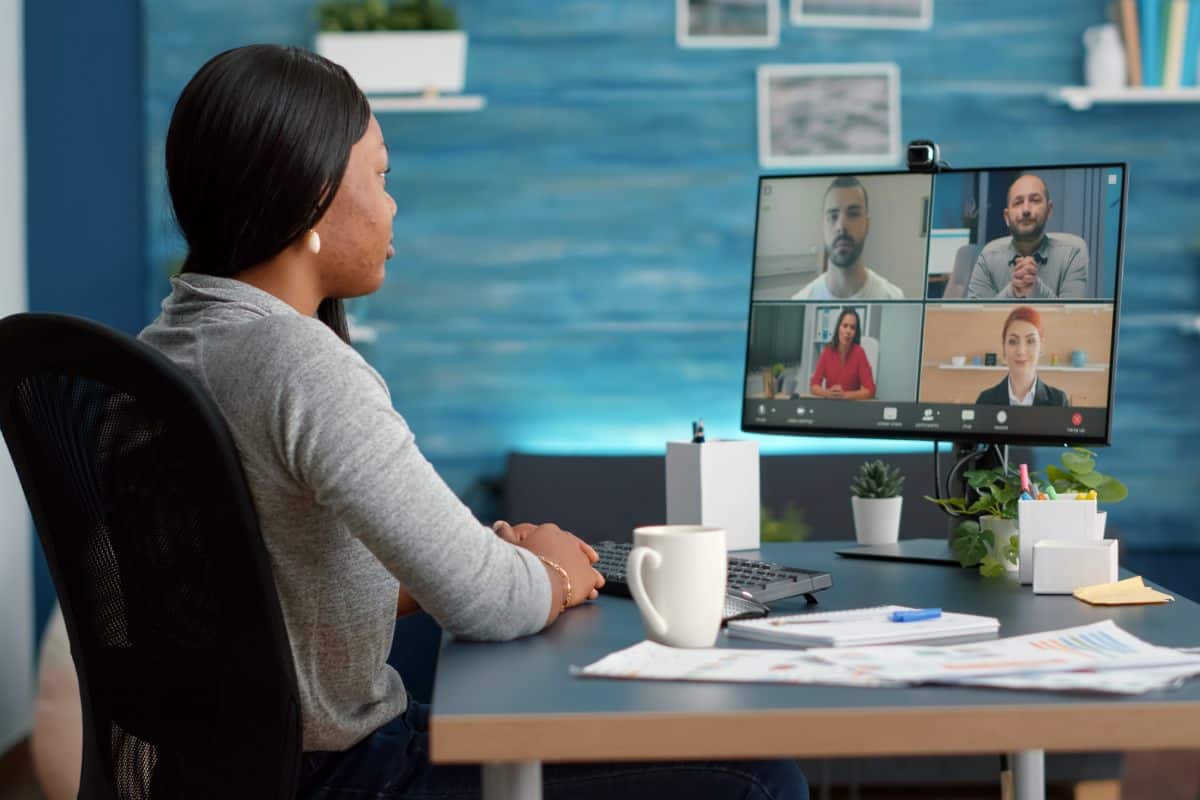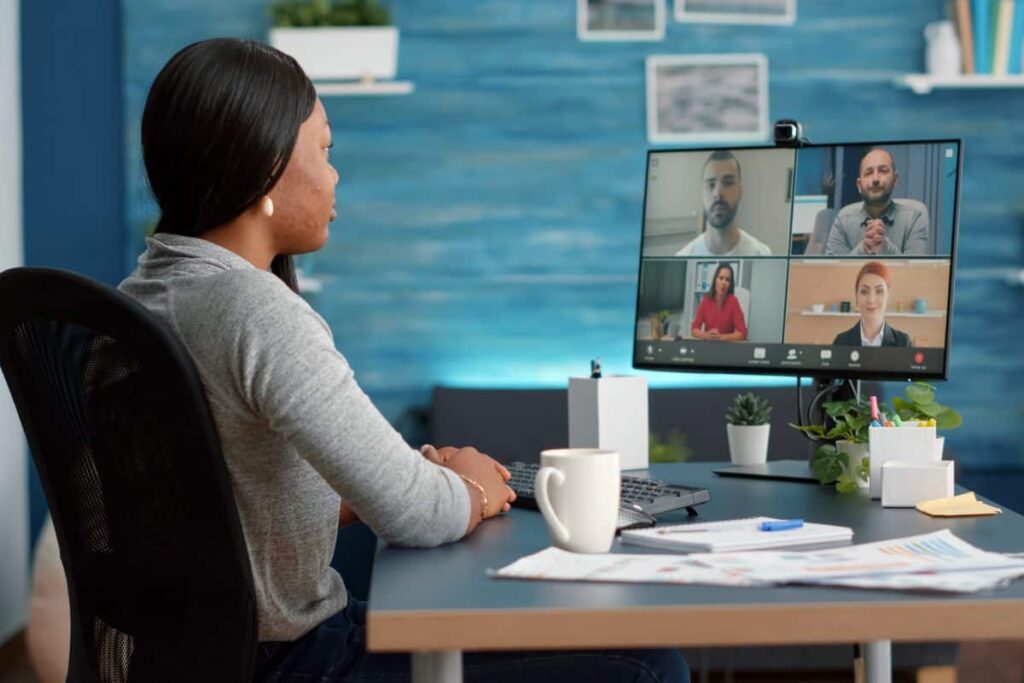The Importance of Cybersecurity for Remote Employees 2024

The Importance of Cybersecurity for Remote Employees
Is your virtual workplace truly secure? With remote work becoming more common, cybersecurity for remote workers is critical. The threats to our online safety are getting more advanced every day.
Workplace security for remote workers is vital, not just a trend. Employees now work from many locations, accessing important company information. This change lets cybercriminals find new opportunities, pushing companies to protect their digital assets better.
Working remotely offers great flexibility but comes with its risks. From weak home networks to scams, remote employees deal with many online dangers. We’ll look into how cybersecurity helps protect your team and keep your business running, even as online threats evolve.
Read More: Why is cyber security important?
Key Takeaways
- Remote work has increased the need for robust cybersecurity measures
- Virtual workplace protection is crucial for safeguarding sensitive company data
- Cybersecurity for remote employees faces unique challenges and threats
- Unsecured home networks pose significant risks to remote workforce security
- Adapting to new cyber threats is essential for maintaining business continuity

Understanding the Remote Work Landscape
Remote work is changing how companies operate. They no longer need everyone in one place. This lets them benefit from a more flexible team but also brings up new issues in keeping work safe.
The Rise of Remote Work
Working from home has become very popular. It’s now normal for companies to have people working in different areas. Making sure this setup is safe has become a big concern for businesses everywhere.
Challenges Faced by Distributed Teams
Teams that are spread out face extra risks in how they communicate. Using different tools and devices can leave info open to attacks. To prevent this, companies should follow strong security rules.
- Securing home networks
- Managing personal devices for work
- Ensuring data privacy across locations
The Evolving Nature of Cyber Threats
Online threats are becoming more complex. Hackers are looking for ways to use home setups to access company systems, making it crucial for businesses to always update their defenses.
As how we work from home changes, staying safe online must change, too. Companies need to make safe online access a main goal and set up clear safety rules for working outside the office.
Read More: Different Types of Cyber Security: A Comprehensive Guide
Cybersecurity for Remote Employees: Key Considerations
Nowadays, many people work from home, which presents challenges in keeping company data safe. Companies must focus on protecting offsite workers from cyber threats.
Read More: What is Cybersecurity? Types, Threats, and Cyber Safety Tips
Ensuring secure remote access is key. Firms should use strong methods to verify who can log in. Encrypted connections ensure that information is safe, lowering the chance of a data breach.
Keeping data secure is vital. Here’s what companies can do:
- Enforce strict data handling policies
- Use encryption for sensitive information
- Regularly back up important data
Sticking to security rules is a must. Remote work must follow laws about keeping information safe. Keeping up with checks and improving security stops new threats.
Training staff is very important in reducing risks. They need to know how to stay safe and what to watch out for, which helps ensure they’re prepared to stop cyber attacks.
When businesses handle these main points, their security gets stronger. This way, they keep information safe, operations running smoothly, and cyber risks low.
Common Cyber Threats Targeting Remote Workers
Nowadays, working from home brings new cyber challenges. With many working remotely, cyber threats have grown. Understanding these dangers is essential to keeping networks and data safe.
Read More: Exploring the Various Types of Cyber Security Threats
Phishing Attacks and Social Engineering
Cybercriminals send fake emails and messages to steal data. These attacks can bypass basic security, so it’s key for workers to be alert.
Read More: What Is Phishing? – Definition, Types of Attacks, Examples
Unsecured Home Networks
Home networks are often less secure than offices, which can put company data at risk. Strong encryption and VPNs help protect it.
Device Vulnerabilities
Personal work devices may lack updated security, which hackers can use to gain access. Updating security software regularly is crucial.
Data Breaches and Insider Threats
It is difficult to monitor data usage at home, which can lead to accidental and intentional data breaches. Setting strong access controls and training staff help protect against these.
- Implement multi-factor authentication
- Use secure file-sharing platforms
- Conduct regular security audits
- Provide ongoing cybersecurity training
Essential Security Measures for Remote Workforce
Keeping your remote team safe requires a mix of strategies. Companies must implement strong security measures that help protect data and staff from online dangers.
VPNs are key for safe connections outside the office. They build a protected path that keeps internet traffic hidden. This tunnel is especially vital for remote workers using public Wi-Fi to reach important company data.
Adding extra steps with multi-factor authentication boosts security. It ensures users give more than one proof they’re who they say they are, making it much harder for outsiders to get in, even if someone’s password is stolen.
- Strong password policies
- Regular software updates
- Encrypted communication channels
Looking after the devices your team uses is also key. Make sure they have the latest antivirus protection, firewalls, and systems to detect problems. This helps stop viruses and hackers from getting in.
Teaching your crew how to be alert online is a game-changer. Regular lessons keep them up-to-date on what to watch out for and how to stay safe. Topics include:
- Spotting fake emails.
- Staying safe while surfing the web.
- Taking care of important info.
By following these security steps, companies can build a strong remote work setup. This ensures the safety of both their information and their team.
Implementing Secure Remote Access Solutions
Secure remote access is key to defending your company against online threats. We’ll examine top solutions for keeping your remote team safe.
Virtual Private Networks (VPNs)
VPNs shield data by creating safe paths. They ensure that information is safe as it moves between the remote team and the company. This protection is crucial for staying safe at all times.
Multi-factor Authentication
Multi-factor authentication needs two or more steps to let users in. It adds a big security boost, making it harder for bad actors to get in. Even if a password is leaked, your important data stays safe.
Secure Cloud Services
Cloud services boost how you work from anywhere. But it’s vital to pick cloud companies that put safety first. This keeps your data secure and helps manage trouble quickly if there’s an issue.
These tools improve your defense against online risks. Remember that keeping everything up-to-date and teaching your team well is important. Covering all bases in cybersecurity keeps your company safe from new online dangers.
Ark Solvers’ Approach to Remote Workforce Security
Ark Solvers makes sure your remote team stays safe. We analyze the cyber risks for your organization. Then, we create security plans that work with how you do things.
Customized Security Solutions
Our team crafts special security strategies for remote workers. We secure their connections and use strong tools to protect information. We also teach your team how to stay safe. With these plans, your team can work from anywhere safely.
Ongoing Support and Monitoring
We monitor your remote systems 24/7. Our team spots and handles threats early, guarding your team’s safety every hour of every day.
Incident Response Planning
Sometimes, despite our best efforts, there’s a breach. We help you prepare. With a solid plan, you’ll know exactly what to do if there’s a security issue. Ark Solvers ensures you’re ready for anything the digital world throws at you.
Read More: Is Cyber Security Expensive? Cost Insights Revealed
FAQ
Why is cybersecurity important for remote employees?
With more people working from home, keeping data safe is key. Cybersecurity stops bad actors from stealing or harming data. When employees work outside the office, they use devices and networks that are only sometimes secure.
What are the common cyber threats targeting remote workers?
The risks include faking emails to trick people (phishing), weak home networks, and easy-to-break device security. Thieves can swipe data this way. Insiders and trickery also pose a big threat.
How can organizations implement secure remote access solutions?
Companies need to set up virtual private networks (VPNs), use multi-factor authentication, and provide secure cloud services. These put up walls to protect data in transit and keep outsiders out.
Why is cybersecurity awareness training important for remote employees?
This type of training is important for teaching workers about threats and safe practices. It helps them spot dangers and respond appropriately, which can reduce the chance of a cyber attack.
What role does incident response planning play in remote workforce security?
It is crucial to be ready to act when a cyber threat strikes. An incident response plan makes fighting back and recovering from attacks easier and keeps the business going even after a hit.
How can a cybersecurity risk assessment benefit remote workforce security?
These security assessments need to be stronger. Knowing these, companies can fix them before they get hit. It’s like knowing your ship is strong before sailing into a storm.
What are the benefits of using a virtual private network (VPN) for remote employees?
A VPN acts like a private, secure tunnel over the Internet. It shields data from prying eyes, making working away from the office much safer and protecting information.
How can organizations ensure compliance with security regulations for their remote workforce?
To follow the rules, companies should encrypt data, secure devices, and control who can access what. Check-ups and keeping people trained also help work within the security guidelines.

